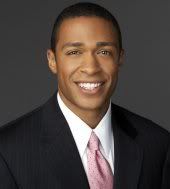Q and A With Former KTHV Anchor/Reporter NOW CNN Anchor
 Arkansas TV News would like to thank former KTHV anchor/reporter NOW CNN weekend anchor/reporter TJ Holmes for taking the time to respond to a handful of questions sent to him about his new career at CNN:
Arkansas TV News would like to thank former KTHV anchor/reporter NOW CNN weekend anchor/reporter TJ Holmes for taking the time to respond to a handful of questions sent to him about his new career at CNN:> Tell me a little about your background in broadcasting.
I have a degree in broadcast journalism from the University of Arkansas . My first job out of college was at the NBC affiliate station (KSN) in
Joplin, Missouri. I was there for 9 months. I was a producer, reporter, and weekend anchor. From there, I went to the CBS affiliate (KTHV) in Little Rock , Arkansas . I was there for three years. I served as weekend anchor/reporter there. From Little Rock , I was hired to be the 5 p.m., M-F anchor at the NBC O&O (KNTV) in San Francisco . I spent three years there before being hired as the weekend morning anchor at CNN.
> How does working at CNN compare to working at the local news level?
One major difference is resources. CNN can do just about anything, anywhere, at any time. A major news network like CNN has more money, people and resources that a local affiliate simply can’t compete with. So, you have the ability to do a lot more. Also, the news is different. Of course, local news has a much smaller area to cover. CNN, on the other hand, covers the world. You cover everything at CNN. So, you have to be well read and knowledgeable about a whole lot more.
Of course, there’s not as much structure to a newscast at CNN as you would find on a local level. In local news, you often have a half hour show that is scripted and for the most part, doesn’t have as great of a potential to change as a newscast at CNN. At CNN, everything changes during the course of a newscast. News breaks all over the world and you have to be ready to handle it. It keeps you on your toes, and it is one of the best parts of the job. Also, you have a lot of live interviews during a CNN newscast which also adds to that unscripted nature of a CNN newscast.
There are tons of other differences, but these are a few that stand out.
> What challenges have you faced so far at CNN?
One of my first challenges was simply getting over the hump, so to speak. Coming from local news, it can be a bit intimidating to make the move to a network-level job. So, the first challenge was simply getting that first newscast at CNN under my belt.
> Some tend to think that since you’re an anchor, that’s all you do … sit there and read the teleprompter for hours. What does the job of a CNN anchor entail?
I know people think of anchors as “reading the prompter”, but at CNN, a lot of our time on the news set is spent not reading, but ad-libbing. A lot of a CNN newscast is unscripted because breaking news happens or interviews are added, etc. Every CNN anchor also reports. We go out in the field. Of course, it’s not on a daily basis, like the field correspondents, but anchors do plenty of reporting.
Also, there are so many challenges and demands on CNN anchors that take you outside of the newsroom. We have responsibilities to the community.
Community groups and organizations often call on us to lend a hand in some way. We often serve as guest speakers, panelist or emcee events.
Many anchors serve on community boards as well.
> For those still working their way to the big time, what advice would you give them to help them along the way?
I always tell people to make up their mind that broadcast news is what they want to do, and make up your mind early. It could be tough and frustrating when you first start out in this business. There are a lot of people out there competing for limited jobs in this business. So, you might not land that great job immediately. Or, your career in broadcast news might not progress as quickly as you thought it might. I have seen so many friends and former classmates drop out of the business because their careers didn’t progress like they thought they might, and they quit. So, these people have spent 4 or 5 years in college and then a few years in broadcast news, only to quit. I recommend people commit to it, realize that it may be tough, and hopefully, it will work out.
Be yourself. People often try to emulate others they see on TV. It’s perfectly fine to study others in the industry, but people often lose some of their own individuality. A news director can find plenty of potential employees who are just like everybody else. But if you can simply be yourself, you stand out because there is nobody out there who is just like you.

<< Home